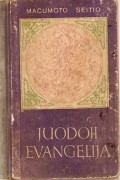 Original language:
Japanese
Original language:
Japanese Translated from: Russian
Authors: Matsumoto, Seicho
Translated by: Vaišnoras, Juozas
Full translated source bibliographical description:
Мацумото Сэйте, Черное евангелие. Iš rusų k. vertė Juozas Vaišnoras. Vilnius: Vaga, 1969 .
Published in: Vilnius
Published on: 1969
Publisher: Vaga
„Black gospel“ is one of the first Macumoto Seitio books, translated in Lithuanian language. This is two part, emotional novel with detective elements.
The novel action is developing at postwar period in Tokyo, Japan. In this story is critically presented about the Christianity spreading time in Japan and about Church activities in the country. Also in the book is inserted a lot descriptions about Tokyo city and public citizens life. The novel is conveyed through several people\’s life‘s and experience. All story is told by third person position, with a lot of emotional feelings and descriptions of surroundings. Some times we can find subtle mentions about the mood of the narrator: irony, displeasure or sorrow.
The novel does not have one plot, it has a few story lines. Firstly the author writhes the story from one character position, then it is change to other. But all characters life‘s is related to the Holy Basil‘s Church. At first in the story is presented the nice relation between people and new faith, but later is revealed the illegal activities of priests in Japan. Suddenly in the city was found the dead body of young parishioner woman. Murder trial reveals a lot of interesting facts about government powers.
This book has two main parts. First part of the book ends with murder scene and the second part explains murder case. Separating the novel in two parts makes the reader fell more interested about the story. As mentioned, in this story there is no one main character, but in the second chapter of the book, the characters change completely. The culmination of story is narrated from opposite attitude. Because of that you can look up at the story from a different position.
In this novel is plenty fragments from the Bible, peculiarities of Priests life and explanations of faith. It‘s helps to the reader understand the Christianity, religious ceremony and the word of God, in the better way. Also there is a lot of descriptions about Japanese daily life. The author does not avoid to write about what Europeans and Japanese differences. In this way the author allows for a reader to compare the two different cultures.
Author Matsumoto Seicho (the real surname Kiyoharu) was born in 1909, Fukuoka, Japan. Following his graduation from elementary school, was a typography worker, served in the military. He began writing at the age of forty, but after the first story he became widely famous. He was awarded the Akutagawa Prize in 1952. From that time the author wrote more than forty books and some of them was translated into Lithuanian language.
